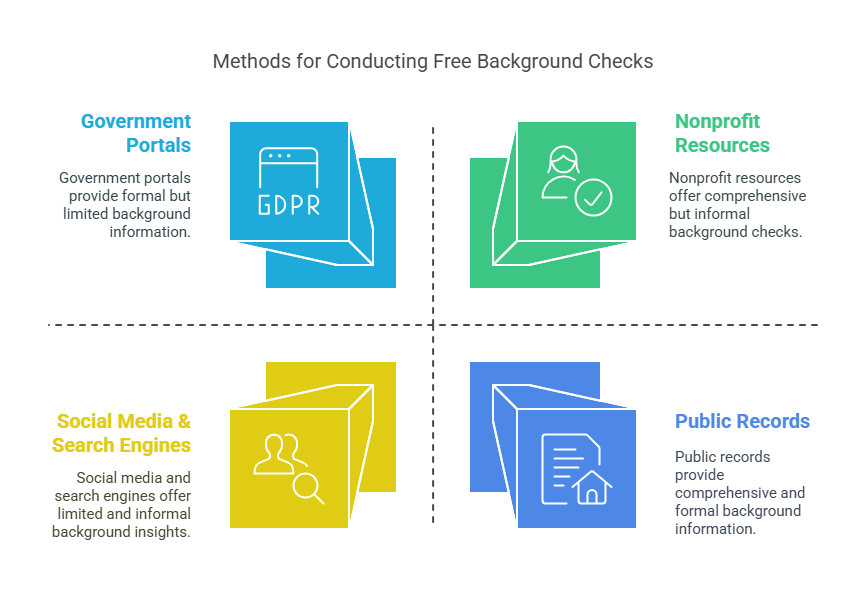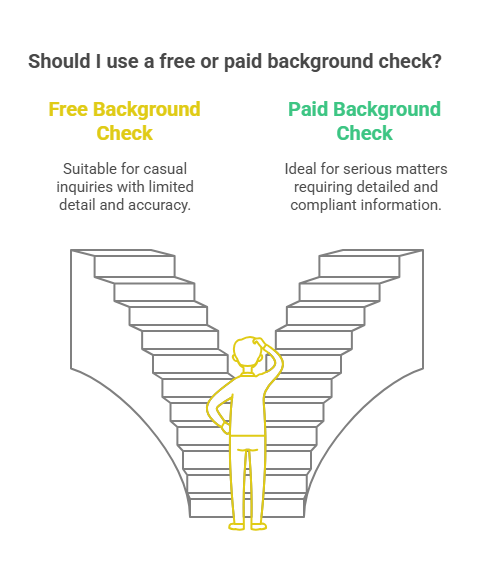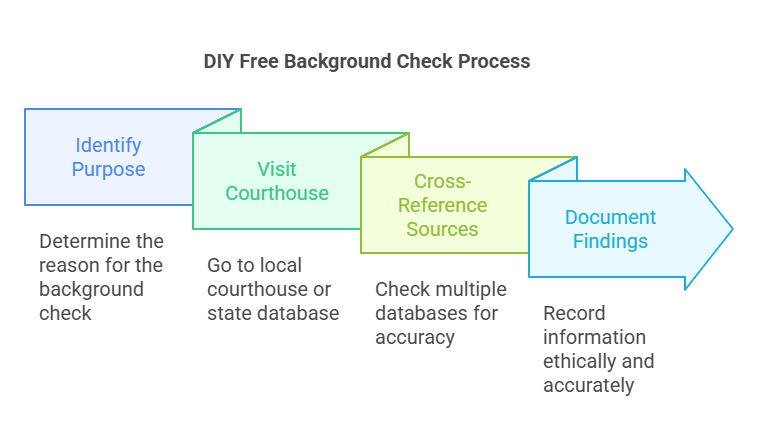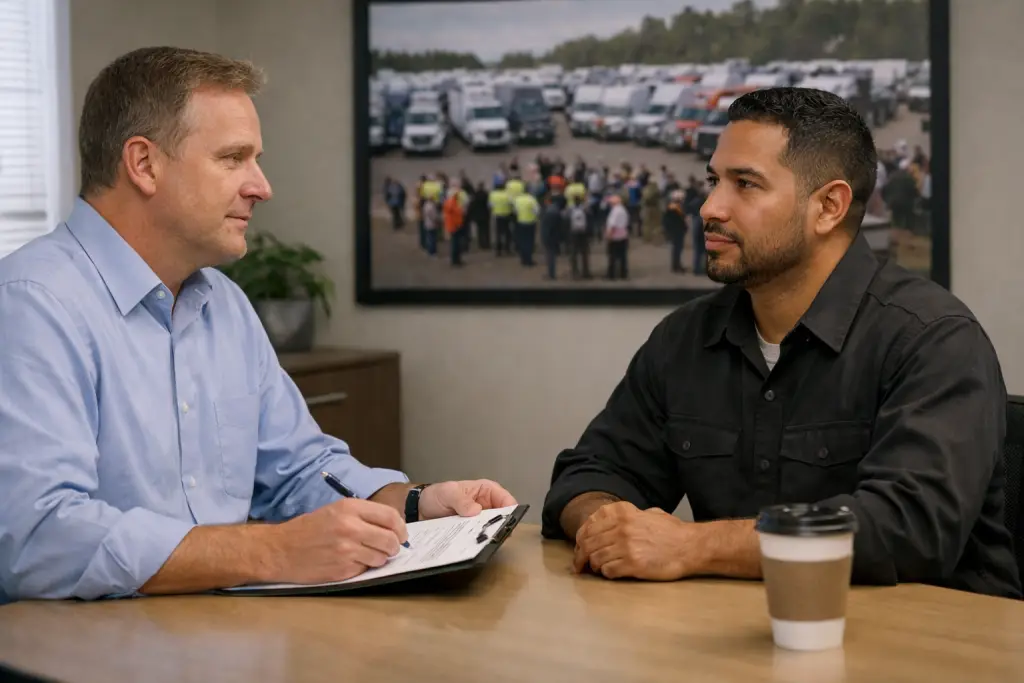Background checks play a crucial role in many aspects of life—from employment screening to personal safety. Understanding the promise and pitfalls of free background checks can help you make informed decisions. In this comprehensive guide, we'll debunk common myths, compare free and paid options, and guide you through the process of conducting a background check legally and effectively.
Key Takeaways
- Most "free" background checks come with hidden costs or limitations in scope.
- Accessing public records can provide some information for free, but comprehensive details often require payment.
- Free checks might miss important data and are typically not suitable for legal purposes like employment screening.
- Government portals and public databases offer free information, but they might not be current or complete.
- Deciding between free and paid services depends on your need for accuracy and legal compliance.
Introduction
Can you really get a totally free background check? The answer is complicated. Many services claim to offer free background checks, but they aren't always what they seem. You might find basic information at no charge, but comprehensive reports often come with hidden costs.
Free background checks can be limited in scope. They rely heavily on public records that may be outdated or incomplete. You won't find comprehensive criminal histories or detailed financial information for free. Paid services fill these gaps, offering more accuracy and depth. They access databases not available in free options, ensuring thorough reports.
The purpose of this article is to help you navigate the options available. We'll explore what truly constitutes a "free" background check and compare it with paid services. We'll guide you to legitimate resources, helping you choose wisely based on your needs. Are free options adequate for your situation, or should you invest in something more reliable? As you read, consider your reasons for seeking a background check. Your goals will determine whether a free option suffices or if you need a paid service for legal compliance.
What Is a Free Background Check? (And What It Isn’t)
The term "free background check" often doesn't mean what you might expect. To understand, let's break down the types of services that claim to be free.
First, public records are accessible at no cost. These can include court documents, property records, and certain government databases. Visiting a courthouse or accessing some state or county databases can give you limited, but genuinely free, information.
Then, there are the platforms offering limited free trials. Services like TruthFinder might allow brief access to their data, but be careful. These trials can lead to subtle charges if you're not vigilant about cancellation policies.
Another type involves employer or tenant screening tools. Here, free may come at a different cost—like sacrificing compliance with the Fair Credit Reporting Act (FCRA). Non-compliant services might provide quick info for free, but they put you at risk if used for employment or housing decisions.
Let's talk about red flags. Some services sneak in fees, despite appearing free. Watch for hidden charges in subscription models. A "free" label might conceal costs buried in the fine print.
When you see "free background check," remember these nuances. Free isn't always truly free, in terms of both cost and compliance. Consider what you're actually getting before you proceed.
EXPERT INSIGHT: In my perspective as a human resources professional who has experience in spearheading background checks, I believe that background checks are the cornerstones of a trustworthy and secure workplace. This benefits not only the organization but also every individual within the organization. Imagine how cool it is to know that every person working in the organization is both physically and psychologically healthy -- This means "mission accomplished" for us in the HR department. - Charm Paz, CHRP
How to Run a Free Background Check Online (Step-by-Step)
Seeking a background check without spending money? Here are five ways you can gather background info legitimately for free:
1. Access Public Records (State & County Databases)
Start locally. Visit your state or county courthouse's website to access public records. Many jurisdictions offer criminal records, marriage licenses, and property deeds online. Some may require a small fee for copies, but viewing is typically free.
2. Use Government Portals
Federal databases offer valuable resources. The National Sex Offender Public Website, for instance, allows you to search for offenders by name or location. PACER (Public Access to Court Electronic Records) lets you access federal court case documents.
3. Leverage Free Trials (With Caution)
Some paid services, like TruthFinder and Instant Checkmate, provide limited free trials. Use them sparingly and cancel subscriptions before the trial ends to avoid charges. Ensure you understand what’s included and establish clear usage goals.
4. Social Media & Search Engines
For informal checks, start with a simple name search on Google. Social media platforms, like LinkedIn and Facebook, may provide current occupations and personal backgrounds. Remember to verify identities to avoid mix-ups.
5. Nonprofit Resources
Nonprofits offering volunteer clearance programs might assist with checks. These organizations often cater to specific community needs and can sometimes offer more thorough searches than you'd expect from commercial services.
Each method has its uses, strengths, and limitations. Always respect privacy laws and ethical guidelines while conducting checks. Consider whether a paid service might better meet your needs if accuracy and comprehensiveness are crucial. By following these steps, you can run a free background check effectively. Which method suits your needs the best?

Why Free Background Checks Often Fail
Free background checks can be surprisingly unreliable. A big reason is outdated or incomplete data. Many free resources don't update in real-time. This can lead to gaps in information, causing you to miss important details.
Another major limitation is the lack of nationwide criminal search capabilities. Free services often pull data from limited, localized sources. This means you might not capture offenses that occurred outside a specific area.
Legal compliance poses another issue, especially if you're conducting checks for employment or tenancy. The Fair Credit Reporting Act (FCRA) sets strict rules, and many free checks don't comply. Using non-compliant methods can risk legal repercussions.
Hidden costs are an unpleasant surprise with many "free" services. They often lure you in with a free trial but have intricate subscription fees tucked away. This can turn an initially free search into an unexpectedly costly one.
Free background checks have their place, but rely on them with caution. For critical situations, they often fall short. Consider if they truly meet your needs before proceeding.
Free vs. Paid Background Checks: Which Should You Use?
Choosing between free and paid background checks depends on your goals. Free checks are adequate for casual inquiries. Suppose you're checking a neighbor or a new acquaintance. Public records can offer surface-level information. Just be prepared for potential gaps.
| Feature | Free Checks | Paid Checks |
|---|---|---|
| Accuracy | Often unreliable | Typically precise |
| Depth | Basic info only | Comprehensive details |
| Speed | Can be slow | Usually fast |
| Compliance | Not always FCRA-compliant | Generally compliant |
When to Use Free Checks:
Opt for free checks for informal context. They are good for casual inquiries, like checking old acquaintances or ensuring personal safety through public databases. But expect limitations in detail and accuracy.
When to Pay for a Professional Service:
Turn to paid checks for serious matters. Employment and tenant screenings require precise, detailed, and legally compliant information, best provided by professional services. Paid options ensure compliance with the Fair Credit Reporting Act (FCRA), reducing legal risks.
Still considering a free check? Reflect on its purpose. If it's just about satisfying curiosity, go ahead. But for high-stakes scenarios, don't cut corners. Invest in a service that provides legal compliance and peace of mind. Your decisions can impact lives. Choose wisely.

Are Free Background Checks Legal?
Using free background checks might seem appealing, but legality isn't straightforward. If you're screening potential employees or tenants, the Fair Credit Reporting Act (FCRA) sets the rules. The FCRA mandates you inform individuals about the check and get their explicit consent. It also requires using compliant services, which free checks generally aren't. Violating FCRA can result in hefty fines.
State laws add another layer. Access to public records varies by state. While some offer online databases, others may require an in-person visit or charge fees for retrieval. Always check your state's regulations before proceeding.
Non-compliant reports pose significant risks. Relying on them for employment or tenancy can lead to disputes and lawsuits. Using free checks for personal curiosity is one thing, but when decisions impacting a person’s livelihood are at play, play by the rules to safeguard your interests.
DIY Free Background Check in 2025: A Legal Guide
Step 1: Identify Your Purpose
Start by knowing why you need the background check. If it's for personal curiosity, you're in the clear. For employment or tenant screenings, specific laws apply. Understanding your purpose helps you follow the right procedures and stay on the right side of the law.
Step 2: Visit County Courthouse or State Database
Head to your local courthouse or state website. Many offer public access to records, though it can vary by location. Be prepared to search for criminal records, property information, or civil case filings. Focus on direct sources to avoid inaccuracies.
Step 3: Cross-Reference Multiple Sources
Check multiple databases for a fuller picture. For instance, a county record might provide arrest details, but state databases could cover convictions. This step reduces gaps in information and enhances reliability.
Step 4: Document Findings Ethically
Keep thorough records of where you sourced information. Ensure any personal details are handled with care. If the check influences a business decision, verify the data with more than one source. Practicing ethical documentation safeguards against potential legal issues.
This guide helps you perform a simple and compliant free background check. Seeking thorough results? Consider professional services for more legally binding scenarios.

Conclusion
Free checks serve basic needs. They offer some insight but often fall short for official purposes. Paid checks provide depth and accuracy. They are crucial for roles requiring thorough vetting, like employment or tenancy. Consider your needs carefully. For personal inquiries, free options might suffice. But for legal compliance, investing in paid services is wise. Always aim for accuracy and reliability when stakes are high. If you need a legally sound report, comparing top-rated providers will guide you to the best choice.
Frequently Asked Question
Is there a 100% free background check service?
Short answer: No. Most claims of "free" background checks come with a catch. Public records can be accessed for free, but compiling a full report usually incurs costs. Be wary of services that advertise free checks but require payment to access full reports.
Can I use a free check for employment screening?
Using free checks for employment is risky. They often lack updated information and don't comply with the Fair Credit Reporting Act (FCRA). For legally compliant reports, use professional services that abide by FCRA rules.
How accurate are free criminal background checks?
Accuracy varies. Public records may be outdated or incomplete. Free checks are useful for preliminary searches. However, for detailed information, especially for legal purposes, invest in a paid service.
What's the best free alternative to paid services?
For basic information, start with public databases like local court records or government websites. These sources won't compile data for you but offer a good starting point. Free trials of reputable paid services can also provide temporary access to more detailed reports, but read the terms carefully to avoid hidden charges.
How to check if someone has a criminal record for free?
You can visit local court websites or government databases. Some states provide access to public records for free. Libraries often have resources and can guide you on where to search locally.
What is the best free criminal background check?
Most comprehensive checks aren't free, but local court records can be a good starting point at no cost. Websites for local police departments may also have information on obtaining records.
How do you know if you have a criminal case?
If you've been arrested, you likely have a case. You can confirm by contacting the clerk of the court in the area where the incident occurred. You may also receive direct communication from the court.
How do you know if you have a case filed against you?
You would typically be notified via mail or in person if a case is filed against you. Checking online court records in your jurisdiction can also reveal this information.
What are other ways to find someone’s criminal history for free?
Check online databases provided by state or local courts. Visit a public library, which might have access to legal resources. Ask the local police department about accessing public records.
Can an employer check my criminal record?
Yes, employers can perform background checks, but they need your consent to do so. Some employers may use third-party services that compile this information.
What should you do if you discover a mistake in your criminal record?
Contact the court or agency that holds the record. You'll need to provide documentation proving the error and request a correction. This may involve submitting legal documents or a written explanation.
Is it possible to expunge a criminal record?
Yes, in some cases. This process varies by location and the nature of the offense. Contact a lawyer or legal aid service to understand the requirements and process specific to your situation.
Definitions
Understandably, navigating the world of background checks can be tricky. Yes, it is complex, but understanding the key terms can help you handle this process efficiently. We got you! Here's a guide for a crystal clear grasp of these definitions.
- Background Check - A process used to verify a person’s history, including criminal records, employment history, and financial details. Employers, landlords, and individuals use them to assess reliability and trustworthiness.
- Fair Credit Reporting Act (FCRA) - A federal law that regulates how consumer credit and background check information is collected and used. It ensures individuals are informed when such reports are used for employment, housing, or other significant decisions.
- Public Records - Documents and information maintained by government agencies that are accessible to the public. Examples include court records, property ownership details, and business licenses.
- Employer Screening - A company background check to verify a job candidate’s history. It helps employers confirm qualifications, ensure workplace safety, and comply with legal requirements.
- Tenant Screening - A process landlords use to check a potential renter’s background, including credit history, criminal records, and rental history. It helps property owners make informed leasing decisions.

GCheck Editorial Team
Meet the GCheck Editorial Team, your trusted source for insightful and up-to-date information in the world of employment background checks. Committed to delivering the latest trends, best practices, and industry insights, our team is dedicated to keeping you informed.
With a passion for ensuring accuracy, compliance, and efficiency in background screening, we are your go-to experts in the field. Stay tuned for our comprehensive articles, guides, and analysis, designed to empower businesses and individuals with the knowledge they need to make informed decisions.
At GCheck, we're here to guide you through the complexities of background checks, every step of the way.






